If Israeli authorities begin to arrest yeshiva students for
draft evasion, the Haredi community will “make the world tremble, with
all our strength and heart,” Rabbi Dov Lando, the spiritual leader of
the United Torah Judaism party, warned on Thursday evening.
Addressing a rabbinical conference in the central city of Bnei Brak,
Lando told the leaders of Israel’s largest yeshivas that unless the
government halts its enlistment efforts, it will find itself facing “a
united, global Haredi Jewry that is fighting for its very soul.”
Many ultra-Orthodox Jews believe that military service is
incompatible with their way of life and fear that those who enlist will
be secularized.
Organized by the so-called Yeshiva Committee, on whose board Lando
sits, the meeting was part of a wave of conferences and initiatives
aimed at stymying increased enforcement measures against Haredi draft
dodgers implemented by the IDF, which in recent days have led to the
arrests of several yeshiva students.
Only a day earlier, the top rabbinic leadership of the ultra-Orthodox community announced
at another conference in the central kibbutz of Ma’ale Hahamisha that
it was absolutely forbidden to enlist in “any military framework.”
Like at that earlier meeting, on Thursday evening, the Yeshiva
Committee issued orders prohibiting yeshiva students from making
separate accommodations with the IDF, insisting that all members of the
community, “without exception,” were required to act solely according to
its instructions, which would be conveyed by a dedicated staff member
at every yeshiva.
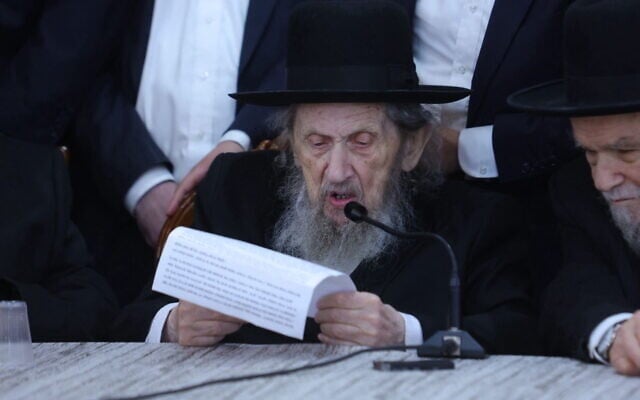
Rabbi Dov Lando addresses an anti-enlistment conference in Bnei Brak,
And while it did not specifically detail what those instructions entailed, the implications were clear.
‘Don’t show up, don’t answer, don’t respond’
While it previously served as the Haredi community’s primary vehicle
for coordination between ultra-Orthodox yeshivas and the Defense
Ministry in matters of service deferments, the Yeshiva Committee
recently began transitioning from coordinating legal deferments to
endorsing draft dodging via its telephone hotline, a Times of Israel investigation found earlier this year.
“I asked them what to do and they said that according to the
instructions of the [rabbis] I shouldn’t do anything,” one yeshiva
student who received a call-up order recalled in March. “Don’t show up,
don’t answer, don’t respond.”
This was also the message in a document circulated among yeshiva
students by the group last week, in which it advised them not to travel
abroad or even to go out in public without good reason.
Noting that the Haredi community’s rabbinic leadership had ordered yeshiva students to ignore call-up orders, the document instructed readers to call the hotline in response to any inquiries or problems.
Similar instructions have previously been issued by former Sephardic
chief rabbi and Shas spiritual leader Yitzhak Yosef, who has said young
men should tear up and flush conscription orders down the toilet. In one case, a building in the Haredi settlement of Modi’in Illit reportedly experienced plumbing problems after his instructions were followed.
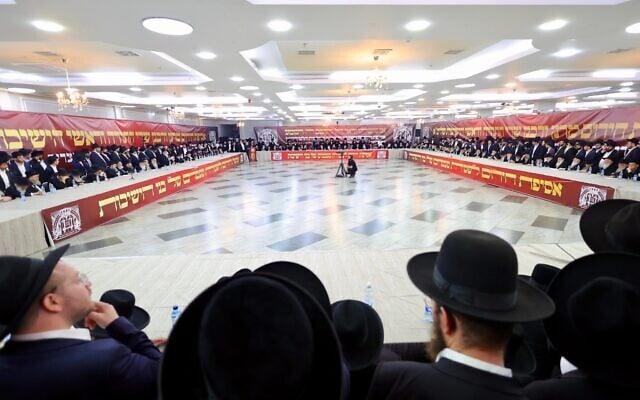
Ultra-Orthodox rabbis attend an
anti-enlistment gathering in Bnei Brak organized by the Yeshiva
Committee
Under Israeli law, a person inciting others to evade service during wartime is liable to a prison term of 15 years.
Mass conscription orders
Wednesday and Thursday’s meetings came on the heels of an
announcement by the IDF that it had completed sending out an additional
54,000 draft orders to ultra-Orthodox men who are eligible for military
service and have not yet enlisted.
The orders constitute the first stage in the screening and evaluation
process that the army conducts for recruits a year ahead of their
enlistment in the military.
The army has stated that it is facing a manpower shortage and
currently needs some 12,000 new soldiers, 7,000 of whom would be combat
troops. Approximately 80,000 Haredi men between the ages of 18 and 24
are currently eligible for service and have not enlisted, generating
significant resentment among secular and national-religious Israelis who
have been doing repeated rounds of reserve service amid the ongoing
conflicts in Gaza and elsewhere.
Both the Ashkenazi United Torah Judaism and Sephardic Shas parties
have been pushing hard for the passage of legislation enabling most
ultra-Orthodox males to continue to avoid military conscription or other
national service, in the wake of last year’s High Court of Justice
ruling that such exemptions were currently illegal on equality grounds.
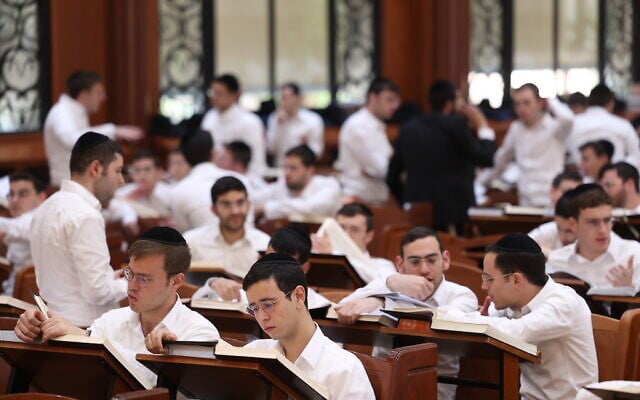
Ultra-Orthodox students study Talmud at the Ateret Shlomo Yeshiva in Rishon Lezion
 |
| GAZA HOSTAGE DAVID FORCED TO DIG HIS OWN GRAVE |
The government’s failure to advance such legislation led to UTJ
quitting the coalition last month. It was quickly followed by Shas,
which, while quitting the government, has remained part of the
coalition.
In the absence of an exemption law, the IDF and the Attorney General’s Office recently announced a new plan for increased enforcement
against draft evaders, under which the timeline for declaring a
candidate for military service an evader would be shortened and
checkpoints to capture dodgers would be set up throughout the country.
Effectively implementing the plan without a law containing strong financial sanctions will be difficult.
Due to a lack of jail space to hold those arrested for draft dodging,
new solutions are currently being examined, the Attorney General’s
Office admitted in early July, noting that the “tools available to the
army under existing law are not enough to carry out effective
enforcement.”
Since then, a number of Haredi draft dodgers have been arrested, sparking protests throughout the country in which demonstrators blocked traffic and caused property damage.
During protests last Wednesday, Haredi demonstrators blocked the
entrance to Jerusalem and caused disruptions on Route 4 near Bnei Brak,
at the Shilat Junction near Modi’in and in Beit Shemesh and Petah Tikva.
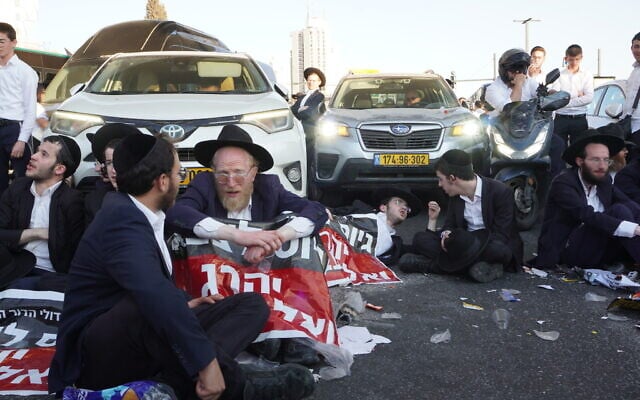
Haredi protesters demonstrate against
efforts to draft yeshiva students into the IDF at the entrance to
Jerusalem on July 23, 2025
Under Jerusalem’s Chords Bridge, the protesters, the vast majority of
them Haredi males, chanted the popular slogan “We will die rather than
enlist” and held up signs against military conscription.
Several days later, Haredim belonging to the extreme Jerusalem Faction demonstrated outside a Petah Tikva police station after being summoned to the scene by a dedicated hotline established by the Jerusalem Faction to mobilize protesters in the wake of arrests.
An extremist ultra-Orthodox group numbering some 60,000 members, the
Jerusalem Faction is considered among the most conservative of Haredi
factions and regularly demonstrates raucously against the enlistment of
yeshiva students.
Flyers distributed by the group’s anti-enlistment “Am Kadosh” (Holy
Nation) hotline have urged members of the public to sign up to receive
updates when yeshiva students are arrested for draft evasion.
Am Kadosh is just one of a growing ecosystem
of hotlines set up by the Haredi community in response to the so-called
“enlistment crisis,” including one linked to former Jerusalem Affairs
Minister Meir Porush.
New initiatives aimed at encouraging Haredim to remain in yeshiva are
springing up all the time, including an English-language hotline run by
a group calling itself “Notnim Gav” (Got Your Back), a spokesman for
which said that “service in the Israeli army is strictly prohibited for
any Torah and mitzvah-observant man.”
Another, called “Ezram U’maginam” (Their Salvation and
Protector), has put up posters in Haredi neighborhoods appealing to
those who have received orders to call for advice, while one
Jerusalem-based group has been handing out flyers to yeshiva students
instructing them not to answer the door if the police show up.
Aside from protesting and holding conferences, members of the
ultra-Orthodox public have supported yeshiva students seeking to avoid
military service financially as well, from fundraising abroad to subsidize yeshiva budgets and offer discounts to draft dodgers.
According to the Walla news site, stores in Modi’in Illit have begun
offering price reductions to yeshiva students who have received draft
orders and have not enlisted.
Overcoming this level of opposition without a conscription law containing strong financial sanctions will be difficult.
Due to a lack of jail space to hold those arrested for draft dodging,
new solutions are currently being examined, the Attorney General’s
Office admitted in early July, noting that the “tools available to the
army under existing law are not enough to carry out effective
enforcement.”
https://blogs.timesofisrael.com/they-are-not-baishonim-nor-rachmonim-bnei-rachmonim/ *
PHOTOS COURTESTY COURTESY THE TIMES OF ISRAEL:




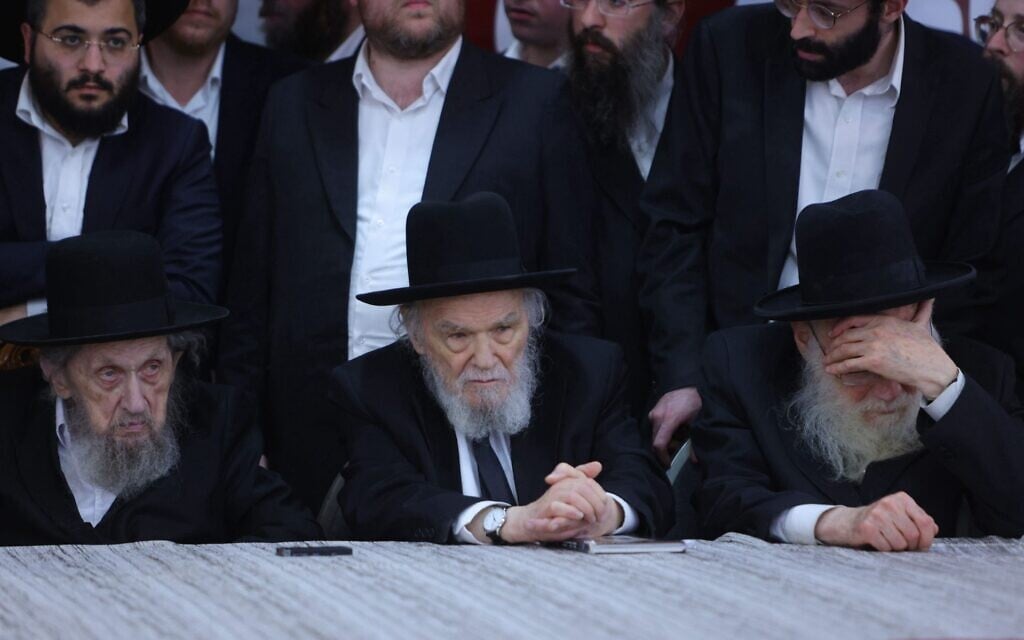









8 comments:
A forced draft will not solve the problem.
Imagine if Israel tries. Massive protests everywhere diverting police resources from where they're needed.
Mass arrests filling the jails. And even if you just take them to army bases, imagine the morale when thousands of new soldiers who don't want to train, don't want to cooperate and don't want to help with anything but demand to be fed and give a place to learn suddenly show up. It will cause chaos.
The simplest solution is the one I've always suggested: If you don't serve - boys in the army, girls in the army or sheirut leumi, you don't get any state benefits. No driver license, no health coverage, no educational function, no housing benefits, nothing. You don't exist for the state.
That would more likely bring out a bunch of them quietly.
Like the indoctrination of the "other" , they were brought up to believe the "secular" Jews are suppose to die for the Torah Jews!
what is their "way of life"? memorizing scripture while others build houses and grow food and participate in society? ultra-orthodox jewry same as utra-orthodox islam?
Isn’t any one not concerned that the haradim would destroy the army they are not capable of taking directions from any officer or superior they are sure they know better. The choice is between having the yeshiva boys in the army or protecting our soldiers and winning the war. Which is more important perhaps having them doing civilian duty would not be as dangerous even though they would probably mess that also for the very same reasons keeping them in the bais medrash is probably the safest thing for the Jewish people.
Israel was founded as a socialist (and mainly secular) country. Its elite used the army and every other tool in its arsenal to acculturate the huddled masses into their worldview. They controlled education to such an extent that Netanyahu’s father who was perhaps the world’s greatest scholar on antisemitism in the period of the Spanish Inquisition needed to come to the u.s. to get a job bc the leftists wouldn’t give a follower of Jabotinsky a job in Israel.
A great thing Israel can do is make its army into an all volunteer army with commensurate pay as Milton Friedman revolutionized the us military and turned it into an all volunteer army. With enough money being paid to soldiers, many charedim will be incentivized to join. Forget about penalizing them for being draft dodgers. Incentivize them to join up and you allow the free market to work. It took Milton Friedman many years to get the US to implement this. I hope Israel will eventually follow suit.
First of all, if the army whipped a bunch of socialist-raised Russian kids from the USSR into shape, they can handle the Chareidim.
The problem will then be the boys developing self-confidence and going back to their communities and standing up to their rebbes.
A volunteer army wouldn't work. First, the US can afford to have one because it has a very large population so even if a miniscule percentage sign up, they still have a large force.
Second, the US has geography on its side. Bordered by 2 nations that are nominally friendly, all their real enemies are oceans away. They need a navy, airways and satellite system more than boots on the ground.
Israel is the opposite. Small population, directly surrounded by enemies. They need men with guns and plenty to protect themselves.
You pay enough money in the free market to get as many soldiers as are needed.
Post a Comment